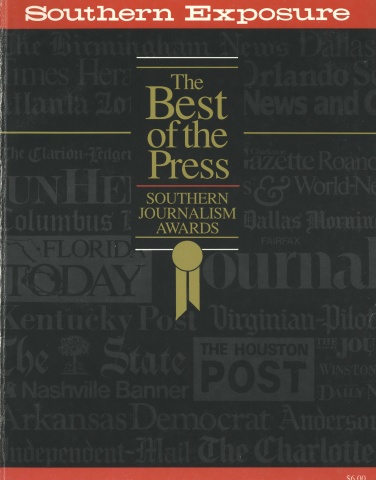The Southern Journalism Awards: Introduction

This article originally appeared in Southern Exposure Vol. 15 No. 3/4, "The Best of the Press: Southern Journalism Awards." Find more from that issue here.
The daily newspaper is the single most influential arbiter of a community's images and information, the stuff of which public decisions and private aspirations are made. For generations, the South's media distorted, ignored, or otherwise discredited news that challenged the status quo and its foundation, the institution of slavery. Black faces were not even allowed on the pages of many newspapers until the 1950s, in some even later; "their" perceptions and experiences were defined by habit and hubris, by racism, as irrelevant.
The region's newspapers still resent affirmative action and resist organized labor, but their ownership and content have dramatically changed over the past 25 years. They increasingly mirror their national counterparts, and, as professionally-run enterprises, they hold themselves accountable to national rather than parochial standards of quality journalism.
Their power in local communities is in no way diminished by these changes. By defining legitimate newsmakers and sources of worthy copy, the press circumscribes the public debate and regulates a community's capacity to analyze its problems and reflect on its potential for change.
The Southern Journalism Awards aim to encourage daily newspapers to use these powers of analysis and reflection to their fullest. The Institute for Southern Studies began the awards this year to honor reporters whose stories broaden the range of issues, voices, and sources typically found in the mainstream media.
Submissions were invited for articles published in daily papers between July 1, 1986 and June 30, 1987 in two general categories: features that cover aspects of "The South in Transition," and investigative reporting that critically examines the practices of private and public decision makers. To our delight, we received 144 entries, nearly all of them series, many including a dozen or more stories.
The hard work of choosing the top four winners in each category, and awarding a total of $2,000 in prize money, fell to four gracious and judicious individuals: Harry Amana, University of North Carolina professor of journalism and contest coordinator; Kip Branch, professor of English and journalism at N.C. Central University; David Cecelski, then an editor of the Harvard Educational Review, now board chair of the Institute; and Chris Mayfield, editor of the Pantheon Books anthology, Growing Up Southern, and former editor of the syndicated column, Facing South.
The judges spent hundreds of hours reading and discussing submissions which, perhaps because of our emphasis on critical reporting, tilted heavily toward the gloomy side of the South and nearly ignored the positive examples of citizens rallying together to change conditions. There were so many good entries, we decided to present excerpts from 27 of the 30 finalists in this special double issue of Southern Exposure. The three missing here are Karen Olson's series in the Tallahassee Democrat on the "Poverty, Patience, and Hope" of a nearly all-black north Florida town, Gretna; John Monks' revelations in the Charlotte Observer of a secret slush fund used by the president of the University of South Carolina to buy gifts for politicians and others; and Nancy Rutter's detailed account in the Island Packet of the real estate deals that rocked Hilton Head's resort community.
Like many other finalists, these reporters used court records, documents obtained through vigorous use of state and federal freedom of information laws, tax filings, other little-used reports, and a wide range of interviews to expose the grotesque and the harmful with clarity and grace.
To all the winners and finalists, and to their collaborators at their respective newspapers, we say congratulations on work well done — and more power to you!
—Bob Hall, editor
Tags
Bob Hall
Bob Hall is the founding editor of Southern Exposure, a longtime editor of the magazine, and the former executive director of the Institute for Southern Studies.